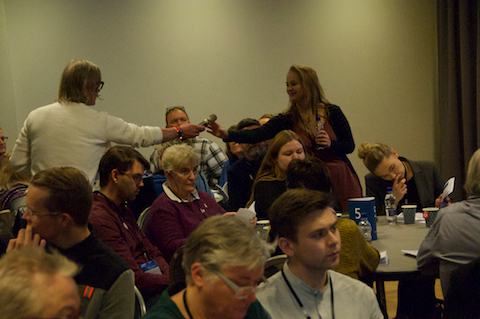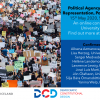
Does Iceland outsource too much of its power?
Since the end of World War II, international cooperation has played a growing role in areas as wide-ranging as economy, security and human rights. Today, urgent global issues such as climate change require extensive collective action across borders. For this reason, nations must increasingly make international commitments, which also need to be reflected in their constitutional order. When states join international organizations or become party to treaties, certain duties and binding obligations are imposed on them. These obligations frequently involve legal issues and may in some cases have stronger force than domestic law. States therefore transfer power to organizations whose decisions may become binding for national governments.
With the Danish-Icelandic Act of Union in 1918, Iceland was recognized as a fully independent and sovereign nation. Consequently, it became an independent party to international organizations and treaties. Today, Iceland participates in many forms of international cooperation. It has been argued that extensive transfer of legislative and executive power may not be in accordance with the Constitution, as it states that Althingi and the President jointly exercise legislative power. To take an example, the possibility of membership in the European Union has been a recurring subject of public discussion in Iceland over the years. EU membership would make Iceland subject to a great number of rules and obligations that have not been discussed or passed by the Icelandic Parliament or the government. The current constitution does not allow for this, and it has even been argued that it hardly allows the transfer of power already necessary because of Iceland’s international obligations. While it is clear that international cooperation must be based on clear authorisation in the Constitution, it is also a cause for concern if the constitution is too permissive in that respect. Therefore, it has been argued that significant international treaties should be decided on by voters, rather than just ratified by Parliament.
Topic 1: Must changes be made?
During the discussion, participants were asked to consider and discuss two statements. First, that the Icelandic Constitution does not need to be amended to facilitate international co-operation agreements. In the information material sent to participants before the meeting, a possible argument supporting this viewpoint was that while it is important that the Constitution grants governments the freedom necessary to engage in international cooperation, it is also important that this does not infringe on the nation’s sovereignty. According to this argument, since Iceland’s international obligations are likely to remain unchanged in the next years, there is no urgent need to amend the Constitution in this regard. An argument suggested against this view pointed out that the Constitution needs to give the government full authorization to do what best serves Iceland’s interests internationally at each time. Both before and after the discussion, 32% of participants agreed that the Constitution would not need to be amended in this regard.
The second statement was that the Constitution must be amended so that the Icelandic government can agree to obligations that may follow from international cooperation. Possible arguments supporting this view correspond to arguments against the first statement: Changes are necessary for the government to be able to truly represent Iceland’s national interests and conclude agreements according to those. The constitution must address and regulate transfer of sovereign power. Possible arguments against included that one of the most important tasks of the Constitution is to guard the sovereignty of the country. The constitution therefore should contain safeguards to prevent the government from going too far in the transfer of power. It would not be advisable for the Constitution to include authorizations that enabled politicians to exclude voters from such fateful decisions. Before the discussion, 45% of participants agreed that the Constitution needed to be amended to clearly allow for extensive international cooperation. After the meeting, a majority of participants (66%) agreed, showing a substantial increase in support for making constitutional amendments to give the government more wide-reaching authorizations in international cooperation.
The questionnaire participants answered before and after the discussion included a few additional questions related to the topic. Participants were asked if they agreed that decisions to implement international agreements must be made according to clearly defined rules, independent of political disputes. Before and after discussions, the proportion of participants who agreed changed from 83% to 92%. The proportion of those who believed that one of the most important functions of the Constitution is to safeguard the nation’s sovereignty decreased by a few percent points, from 87% before the deliberative meeting to 81% after it ended.
A common theme during the discussions was that many participants did not feel not informed enough about the matter at hand. Additionally, many were not sure what exactly the current Constitution says, and others were unsure of what transfer of sovereign powers actually means. Therefore, some participants did not feel comfortable expressing their views on the topic. At the same time, many participants emphasized the importance of the issue in general, and recognized the many forms of international cooperation Iceland already engages in. Many participants wondered if the Constitution’s provisions had already been exceeded. For example, some participants wondered if the EFTA and EEA agreements were in conflict with the Constitution.
Topic 2: The transfer of power, national resources and security
Most participants acknowledged the positive sides of international cooperation and its many opportunities and benefits for Iceland. Some participants especially mentioned cooperation in the field of science, education and mutual trade agreements as examples. A common perspective was that because Iceland is a small nation, cooperation with other nations and international institutions is crucial. A few participants pointed out that many advances had been made through international cooperation, e.g. regarding human and civil rights, that might not otherwise have been achieved. Some participants expressed a desire for more extensive cooperation with the Nordic countries, since they are our closest neighbours and allies. One participant talked about how people must see closer international cooperation as a positive development in a world that keeps getting smaller.
At the same time, most participants called for more constitutional clarity on the issue of the transfer of power. Many argued that the Constitution must clearly state what kinds of powers can be transferred, and for what purposes. While discussing this, one participant said that it was more beneficial to approach the issue on basis of the assumption that cooperation is the source of mutual benefit, rather than a form of risk taking.
The issue of natural resources was a frequent theme during the discussions. Many participants were adamant that natural resources must fall under national ownership. Most considered it important that control over resources could not be given away to foreign parties, except with severe restrictions. The government should neither have the authorization to sell natural resources nor to make any irrevocable contracts involving their exploitation.
Another prominent theme was national security and war alliances. Iceland has no military, and therefore it was not surprising that anti-war and anti-military attitudes were prominent. Many participants argued that the Constitution must clearly uphold the principle that Iceland is military free , and any involvement in military alliances or operations must reflect this. The Iraq War frequently came up, with numerous participants claiming that Iceland’s support of the US led invasion in 2003 had been illegitimately given by the Prime Minister and the Foreign Minister at that time, who had acted alone, without seeking consent from Althingi. In this context, participants discussed how much authority politicians have – and how much authority they should have – in matters of national security, without being required to consult the public.
Many participants also spoke about NATO and expressed dissatisfaction with Iceland’s membership in the alliance. As an example, one participant said that the Icelandic public had never agreed to join NATO. A few participants mentioned feeling that security matters were shrouded in secrecy, concealed from public view, and that the public was never consulted on such matters. Some were not sure what obligations Iceland has as a NATO member and wondered if they are in accordance with the Constitution.
Topic 3: What needs to be changed?
Participants generally agreed that the Constitution should have very clear provisions regarding international cooperation and the transfer of powers. Some felt that recent debates in Iceland, for example regarding the so-called “Third Energy Package” – an energy market legislation aimed to improve the functioning of the EU’s internal energy market – would have been easier if the Constitution was clearer on the subject. Many people were concerned Iceland’s sovereignty could be harmed and emphasized that the Constitution must be so designed that no doubt will arise about what the government can and cannot do . One participant said that as there had been many changes regarding international cooperation over the last decades, it was not unnatural that the Constitution needed to be reviewed and amended because of these changes. However, quite a few participants said that they were not concerned with a lack of clarity and did not think that that the Constitution needed to be amended in this regard. One participant said that as Iceland already has ample access to many forms of international cooperation, amending the Constitution did not seem pressing.
Many participants felt constitutional safeguards to be urgent in order to prevent politicians from accepting oppressive obligations to be imposed on Iceland. Some participants were concerned that unclear regulations and boundaries could be misused by politicians. In general, mistrust toward the government, Althingi and politicians in general came out rather strongly during this discussion. One viewpoint was that it needed to be clear what Althingi and the Government could decide on their own, e.g. regarding international cooperation and the transfer of powers, and where the public should be consulted. Quite a few participants felt that Althingi should not be able to enter new treaties, agreements or alliances without input from the public , i.e. in the form of national referendums.
While many participants argued that important decisions regarding international cooperation should be decided on in national referendums, others pointed out that such subjects were complicated and might be difficult for the public to navigate. It would therefore be better to entrust such matters to experts. In one group, a participant said that that he preferred to put his trust in MPs and to accept their decisions. This participant did not want to be forced to familiarize himself with complicated issues. A few in the group agreed. Another participant said that issues concerning international cooperation could often become emotional, and thus prone to being weaponized by populists who want to inspire fear. In those cases, the public would not know what it was agreeing to or rejecting. Clear definitions and boundaries in the Constitution needed to be the basis of informed decision-making. Nonetheless, most participants felt that important decisions regarding international cooperation needed to be put to a national referendum. Some said that referendums should at least be held for the “big issues”, as there is a difference between trade agreements and more intimate cooperation, e.g. EU membership.





















